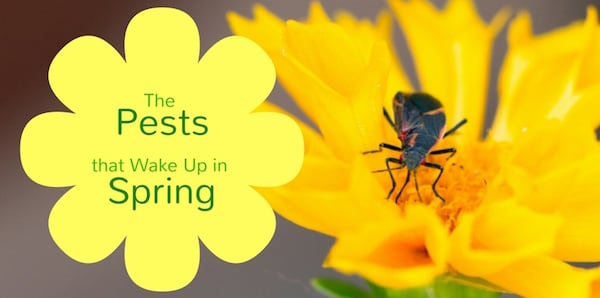The whole world seems to come back to life in spring. Unfortunately, “the whole world” includes some things we wish would stay sleeping. Along with grass, flowers, trees, and birds, a whole host of Michigan’s most annoying pests wake up every spring.
When pests wake up in spring, they’re usually hungry, thirsty, and ready to find mates. To make up for their long winters off, they tend to pursue these activities ferociously. Their single-minded pursuits make pest problems all-too-common this time every year. Here are the pests you’re bound to run into this spring, what they’re up to, and the problems they cause.
Boxelder bugs
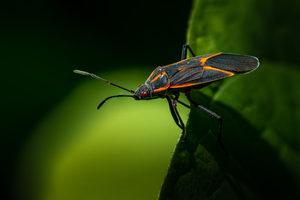 Starting in early fall, boxelder bugs go looking for dry, warm places where they can wait out the winter. Unfortunately, those dry, warm places often include our homes. When spring comes around, boxelders become active again to seek their newly rejuvenated food sources and, eventually, to reproduce. When that happens, they vacate their winter hideaways en masse. If they were hanging out in your home over winter, you’re going to run into them again this spring.
Starting in early fall, boxelder bugs go looking for dry, warm places where they can wait out the winter. Unfortunately, those dry, warm places often include our homes. When spring comes around, boxelders become active again to seek their newly rejuvenated food sources and, eventually, to reproduce. When that happens, they vacate their winter hideaways en masse. If they were hanging out in your home over winter, you’re going to run into them again this spring.
Boxelder bugs are obviously a nuisance, but luckily they’re not a dangerous one. These pests don’t bite, spread disease, eat fabrics or stored foods, or lay eggs indoors. Instead, they simply vacate the premises to seek the seeds and flowers of acer trees like the boxelder. The nuisance part comes from how many of the gross bugs you may notice vacating. Boxelder excretions and feces may also stain window ledges and other favored areas.
Stink bugs
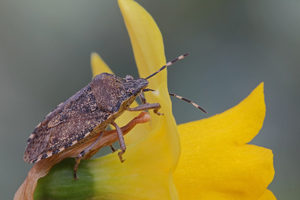 Stink bugs follow a similar seasonal routine to boxelder bugs, and they’re around for the same reasons. During fall, they desperately seek out any warm place where they can wait out the winter. Once they’re in position, they go dormant until outdoor temperatures rise back up to survivable temperatures. Once that happens, they wake up with one thing on their mind: mating. In their mad scramble to get back outdoors, however, they tend to get lost… or stuck.
Stink bugs follow a similar seasonal routine to boxelder bugs, and they’re around for the same reasons. During fall, they desperately seek out any warm place where they can wait out the winter. Once they’re in position, they go dormant until outdoor temperatures rise back up to survivable temperatures. Once that happens, they wake up with one thing on their mind: mating. In their mad scramble to get back outdoors, however, they tend to get lost… or stuck.
Like boxelder bugs, stink bugs don’t reproduce or nest indoors, cause disease, or bite. They do… stink, however. When threatened or crushed, stink bugs secrete a foul-smelling substance from a special scent gland. This scent smells like rotten vegetables or coriander. The more stink bugs secrete at once, the more powerful the stench. These secretions can also leave behind a dark yellow stain on carpets, furniture, or window sills.
Carpenter ants
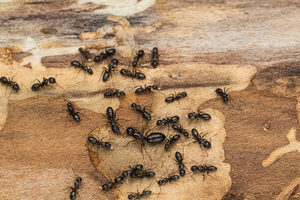 During spring, the infamous wood-infesters come marching in to build their nests and search for water. Carpenter ant invasions tend to be the most noticeable during the start of the season. Starting in mid spring, the reproductive carpenter ant castes swarm in order to seek mates and start new colonies. After mating, queen ants seek good places to lay their eggs. These eggs hatch into workers, and the infestation begins in earnest.
During spring, the infamous wood-infesters come marching in to build their nests and search for water. Carpenter ant invasions tend to be the most noticeable during the start of the season. Starting in mid spring, the reproductive carpenter ant castes swarm in order to seek mates and start new colonies. After mating, queen ants seek good places to lay their eggs. These eggs hatch into workers, and the infestation begins in earnest.
Carpenter ants are a problem because they make their colony nesting grounds by boring through wood. The tunnels they carve compromise the structural integrity of wood products. Carpenter ants don’t actually eat the wood they infest. Instead, they have to hunt for sources of protein and sugar. You may find foragers in your kitchen, basement, or garden. Keep a close eye out for swarmers, in particular. If these flying ants get trapped in your home, chances are their nest is also inside your home.
Pavement ants
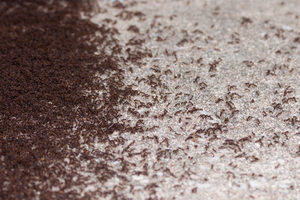 Unfortunately, carpenter ants aren’t the only ants reproducing and foraging in the spring and summer. In late spring, the brief but very active pavement ant mating season begins. During this time, you may notice swarms of larger-than-average, reddish-black ants flying in large clusters. After mating, pavement ants lay eggs in tight crevices (hence their association with pavement, and the cracks in it). When young pavement ants emerge, they start looking for food almost immediately.
Unfortunately, carpenter ants aren’t the only ants reproducing and foraging in the spring and summer. In late spring, the brief but very active pavement ant mating season begins. During this time, you may notice swarms of larger-than-average, reddish-black ants flying in large clusters. After mating, pavement ants lay eggs in tight crevices (hence their association with pavement, and the cracks in it). When young pavement ants emerge, they start looking for food almost immediately.
Pavement ants are most often encountered in groups in your kitchen. They break down and carry off all sorts of stored food, especially grains and sugars. When they find food, they tend to stick around. It’s not uncommon to find ants infesting cabinets, pantries, cupboards, and anywhere else they could find food. They’ll attack any scraps they can get their mandibles on. Unlike other pests on this list, they can stay active as long as they’re warm and they have food.
Spring should be a wonderful, refreshing time of year–especially after a brutal Michigan winter. Don’t let pests ruin that for you. If you need some help fighting back an infestation so you can enjoy the nice parts of spring again, give Griffin a call. We can deal with the dirty work so you can enjoy the rest.

